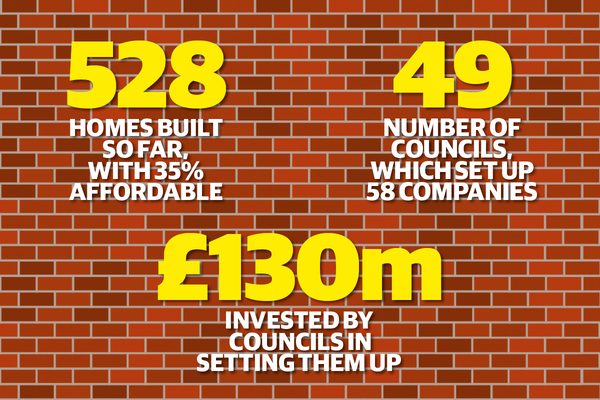You are viewing 1 of your 1 free articles
Take-off time for council housing companies?
There are scores of local authority-owned housing companies, but are they ever likely to deliver new homes on an impressive scale? Steve Sampson reports. Illustration by Peter Crowther
Are local council housing companies an answer to the housing crisis? That was the question posed by the housing committee of the Greater London Authority (GLA) in early September.
Along with many others in the sector, its eyes have turned to the new generation of council-owned builders that have emerged during the past few years with grand ambitions to fill the gap in housing provision left by a wider market failure.
Much has been made of their ability to act beyond the constraints of councils’ Housing Revenue Account (HRA) borrowing restrictions, as well as the benefits of developing for-profit to cross-subsidise affordable housing and services.
In London alone, 17 of the 32 boroughs have active wholly owned development companies – separate commercial companies owned by councils. In total they are planning to deliver 12,700 homes over the next five years, according to thinktank Centre for London.
However, an Inside Housing investigation in February revealed that while almost a quarter of councils in England had invested £130m in setting up 58 new housing companies since 2012, only 538 homes had been delivered. Of that stock 35% is affordable
Last month, the Social Housing Green Paper muddied the waters by stating that “local authorities should deliver new affordable housing through their HRA” unless they have transferred their stock or the HRA cannot sustain new development.
So are council-owned housing companies really about to take off? And if so, when?
“Brick by Brick was always going to be a play at scale,” says Colm Lacey, managing director and chief executive of the independent development-focused housing company that was launched by Croydon Council in south London in 2015.
“But it is also a play at realising the value of small sites, from which other developers have run a mile,” he says, adding: “And to build the capacity to do that takes time.”
The challenge, he says, has been creating a development company from scratch that can deliver a mix of tenures in significant numbers across a diverse portfolio of sites.
The first year was about developing a corporate structure, identifying development sites and securing funding. The second year involved winning planning consent for Brick by Brick’s first batch of sites, which are predicted to be finished early next year.
It has meant building the capacity to coordinate batches of up to 28 planning applications in one go, locking in architects and a construction supply chain attuned to working across multiple micro-sites, and using modern construction approaches such as offsite panelling systems.
We are building #new & #affordable homes. Our #Shrublands #development in Shirley, #Croydon, is 100% affordable rent. Comprising of 26 generous homes with dual aspect and big balconies.
— Brick by Brick (@bxbdevelopment)
Register for a Brick by Brick home t.co/ggtWbCxeqG & keep up to date #homesforLDN pic.twitter.com/2i5I2UCPrLWe are building #new & #affordable homes. Our #Shrublands #development in Shirley, #Croydon, is 100% affordable rent. Comprising of 26 generous homes with dual aspect and big balconies.
— Brick by Brick (@bxbdevelopment) September 8, 2018
Register for a Brick by Brick home https://t.co/ggtWbCxeqG & keep up to date #homesforLDN pic.twitter.com/2i5I2UCPrL
A tweet by Croydon Council’s company Brick by Brick
“We have planning consent for about 40 schemes, and we are on site for around 12 of those, and in the early stages on another 12,” says Mr Lacy.
“Our first completions are due in January and will deliver aroun 700 units, and we have consent for another 700 that we haven’t started yet.
"Our intention is deliver 500 units a year in perpetuity, and in doing so we’re moving towards delivering 20% of Croydon’s GLA housing target,” he adds.
Of those homes 50% will be affordable, half of which will be for rent and half shared ownership.
And, Mr Lacey says, Brick by Brick is already making its presence felt among planners and other developers.
Previously, Croydon has achieved about 16% affordable homes through developments. “We’re achieving three times that in our planned developments,” says Mr Lacey, “so it’s grist to the council planner’s mill to demand those sorts of numbers from other developers.”
Making the sums add up is key for housing companies that are all too aware they are backed by public money and driven by political will.
In Barking and Dagenham in east London, Be First, a standalone council-owned development and regeneration company that was launched last year, has been revisiting the figures on 44 development sites that it inherited from the council on gaining its independence.
By introducing innovative building techniques, acquiring adjacent sites, and drilling down on the density of each development, Be First believes it can deliver an additional 400 homes during the next five years from legacy projects alone.
For Pat Hayes, Be First’s managing director, the process was the first step in the company’s mission to bring “commercial acumen and enterprise to accelerate development and to help build over 50,000 much-needed homes in Barking and Dagenham”.
But Be First’s vision for regeneration far exceeds housing, seeking to rejuvenate the borough’s economic and cultural ambitions.
One landmark scheme seeks to breathe new life into Barking town centre, delivering 400 mixed-tenure homes, retail and commercial units, improved access and public space.
Another plan aims to build London’s largest film and TV studios for 25 years opposite Dagenham East Station. Along with a film-based visitor centre and a leisure, food and beverage offering, Be First says it will generate up to 7,000 new jobs.
Making the sums add up is key for housing companies
To help meet these ambitions, the council has outsourced its planning function to Be First, both for the housing company’s schemes and for other developers, through a nascent commercial arm that will work on a consultancy basis.
Be First says the deal ensures absolute rigidity in terms of responsibility on planning decisions, but the outsourced planning function offers the borough greater agility when encouraging investment, allowing it to work in a more concentrated way with developers in the pre-planning process to accelerate development.
Giving a hint of what is perhaps to come, Mr Hayes says: “We are evidence of a more confident, expansive municipalism, reminiscent of the early days of the local authorities, when imaginative and urgent measures were needed to address the failure of the market to deliver quality homes.”
Not all local authorities have taken on the role of a pure developer, as Brick by Brick has, or the wider regeneration strategy being employed by Be First. Many countrywide are building to manage rented properties long term.
How many housing companies?
Figures correct as of 16 February 2018
Earlier this year, Inside Housing sent Freedom of Information requests to English councils to find out how many had set up housing companies and what they were building.
We found that 58 companies had been set up, with an investment of £130m. At that time, the companies had built just over 500 homes, none of which were for social rent. 35% of the homes built were for some sort of affordable tenure.
However 59% had yet to deliver any homes.
Established in 2014, Red Door Ventures was the first local authority-owned housing company to set its sights on delivering a large programme of private rented homes.
Wholly owned by the London Borough of Newham, it was launched with an ambitious 13-year plan to build 3,000 homes and acquire a further 500 properties.
According to chief executive Aniekan Umoren the mission is twofold: to raise standards in a private rental market that has become tainted by rogue landlords, while securing a significant and reliable source of revenue.
“Around 50% of the private rental stock in the borough is of questionable or poor quality,” she states. “And many of our most vulnerable residents live in private rented accommodation.
“We want to be a significant player in the market to raise the standards within, and the perception of, the sector. We want people to think about the private rental sector as the best choice, as they might on the continent.”
Red Door Ventures has about 160 properties in its portfolio, and planning permission for 948 units on 13 sites that it is ready to deliver with a 50:50 mix of affordable and market rent properties. It hopes to sign off this scheme in October.
“We want to be a significant player in the market to raise the standards within, and the perception of, the sector" Aniekan Umoren, Red Door Ventures
The flexibility of the model is attractive to local authorities, says Mark Baigent, the author of the guide How to Set Up a Local Housing Company, who believes the approach should be embedded countrywide and has the scope to grow quickly.
In light of the government’s green paper, he stresses it is not an either/or choice for local authorities between developing through the HRA or establishing a housing company.
“In Tower Hamlets there is a twin-track approach. The council is going to continue developing traditional council housing through the HRA, and supplement that with development through housing companies, so it is not one or the other, it is both. It is all led and driven by the authority,” says Mr Baigent, a consultant currently working with the authority.
What do those interested observers from the GLA think? For Sian Berry, chair of the London Assembly housing committee at the GLA, the proof will be in the delivery.
“These new organisations seem to be able to work much more flexibly than councils can using their traditional methods. What we are yet to know is if these new organisations will actually deliver more affordable homes, more quickly and of a high quality. We will be closely monitoring their progress.”
Tech Leaders 2018
We unveil Tech Leaders 2018 - a list of the tech innovators digitally transforming their organisations:
Sponsored by Hitachi Solutions




